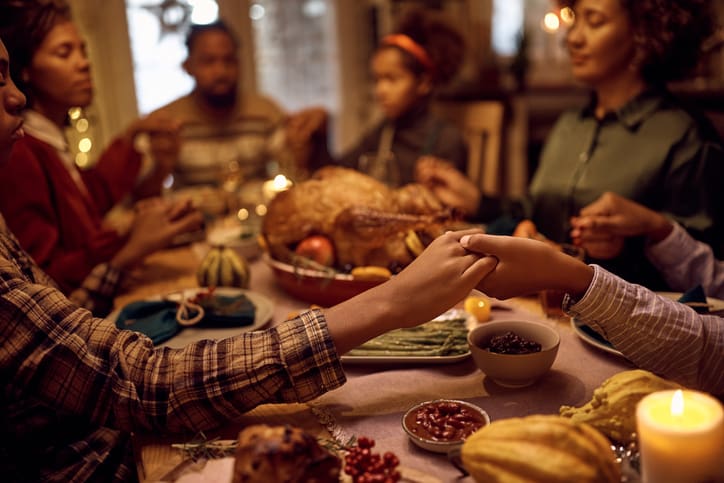Thanksgiving is approaching, bringing with it memories of Thanksgivings past and excitement, worry, or a mix of emotions about Thanksgiving 2024. If you celebrate Thanksgiving and happen to be newly in addiction recovery, the holiday will likely hold some extra complexity. How can you make this year’s celebration one that supports your sobriety? We have some suggestions.
Start and End with Gratitude
What better time of year to feel grateful for your sobriety than Thanksgiving? Whatever happens this year, whatever stresses arise, return again and again to the feeling of thankfulness that you are sober. Be grateful for the clear head, open heart, and extra energy that sobriety makes possible. Be grateful for the friends and/or family members who have loved and encouraged you in your journey. Be grateful for the people in your recovery support group who inspire you to push through the tough times.
Studies show that the brain thrives on gratitude. When we are beset by negative memories or anxiety about the future, gratitude returns us to the present. Making gratitude a daily practice releases hormones in the brain that ease anxiety and depression, improve sleep, and bolster the immune system.
On days it feels hard to bypass anxiety and connect to gratitude, go small. Be grateful for the warmth of your bed, the smell of breakfast or coffee, or a cat video that makes you smile.
Know Your Triggers
Thanksgiving often brings large groups of family and friends together. And family, bless their hearts, can sometimes be the worst trigger to take a drink or get high. If you know that your typical Thanksgiving crowd will spark intense feelings of anxiety, anger, sadness, or a desire to please, make a plan to protect yourself. You have several options here:
- Don’t go. Have an alternate celebration, perhaps with sober friends from your recovery group. This may be very difficult to do because of how your family will react. But you are allowed to put your sobriety first. The people who love you will understand and support your decision.
- Go for a limited time. Choose the time frame that will be the least likely to spark anxiety: the appetizers, the meal itself, the football game after the meal, dessert, etc.
- Take a sober friend. Obviously, you’ll need to clear this with your host, but having a sober friend along can significantly boost your ability to stay sober and calm. Alternatively, you could agree with a sober friend to be on call for each other, and even arrange to call each other at specific times throughout the day to check in.
You may think of other creative ways to survive the holiday with difficult family members without sacrificing your sobriety or mental well-being. Just remember that you have every right to make the choices that support your health.
A Cautionary Note: Isolating yourself on a holiday is not necessarily a great alternative to a large family gathering. If you decide to spend the holiday alone, make sure you plan activities for yourself that will keep you relatively busy and in a good mood. Better yet, go to a recovery support meeting, volunteer to serve food at a homeless shelter, or invite a friend or two over for a substance-free celebration.
Be Helpful
One of the best ways to keep cravings at bay and to keep your mood light is to be helpful. If you are nervous about celebrating Thanksgiving but sure you want to spend it with the usual crowd, be helpful. If you’re the host, you’ll have plenty to do. If you’re not the host, offer to help by preparing food, cleaning up dirty dishes, cleaning the house, entertaining children, taking care of pets, raking leaves, and more. You can keep yourself busy and be social at the same time.
If, for example, your family likes to sit at the table after the meal for drinks and conversation, and you know the presence of alcohol will be triggering, clear the table and wash the dishes. If watching the football game after the meal is a trigger, organize a game for the kids and play it with them.
Ask for Help
If you are the host of the celebration or typically expected to do much of the work in making it possible, monitor your stress levels. Maybe you enjoy the work and find it a good distraction from cravings. But if you find that the opposite is true–that the stress of meal planning and preparation makes you long for your substance of choice–ask for help. And if you know that you will not be given the help you need, make an alternate plan. Tell your family that you cannot handle the hosting duties this year, and offer alternatives: going out to eat, having the meal at a different person’s home, ordering take-out, etc.
If you focus on the point of Thanksgiving, which we would argue is to enjoy some time with family and to express gratitude for the bounty in your life, you can find a lot of room for celebrating the day in new, creative, and anxiety-free ways.
Las Cruces Recovery Center Gives Thanks for Our Clients
Sometimes holiday stress can overwhelm and lead to a slip or relapse. If you relapse over Thanksgiving, don’t wallow in guilt or a sense of failure. Instead, take a deep breath and get yourself back into treatment. Our team in New Mexico can help you find your path again and make adjustments to your relapse prevention plan going forward. Contact us anytime to learn more.



